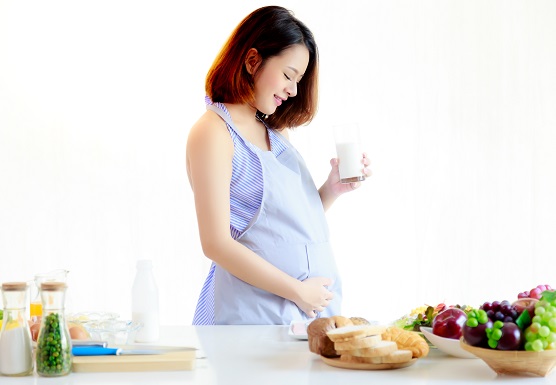Nutritional Tips During Pregnancy

One of the first few things you should take note of once you know you are pregnant is eating well to safeguard your health and support your growing baby. Read on to find out more about nutritional needs during pregnancy.
FIRST TRIMESTER
At this stage, the foetus does not increase very much in weight or size, so your energy needs do not increase substantially. But the need for vitamins, minerals and protein increases to support rapid cell division and organ development in the foetus. So, you really do not have to eat a lot more at this point but focus on selecting nutrient-dense food such as a maternal milk supplement to deliver valuable nutrients such as protein, vitamins and minerals.
SECOND AND THIRD TRIMESTERS
Your caloric needs increase in the second and third trimesters as the foetus gains weight rapidly. In the last three months of pregnancy, the foetus triples in weight and deposits large amounts of nutrients. For example, DHA accumulates in the eyes, brain and nervous system; iron is packed away in the liver for the first six months of life, when breastfeeding is exclusive; and calcium is deposited to strengthen bones. In addition, your body changes to support the pregnancy. Your caloric needs will increase from an additional 370 kcal each day in the second trimester to 480 kcal per day in the third trimester. Aim to eat enough – not too little and not too much – and enjoy a wide variety of nourishing food.
ADD VALUE
Eat a Well-balanced Diet
Include a variety of nutritious food such as wholegrain bread, brown rice, fruit, vegetables, legumes, lean meat, fish, poultry, eggs, nuts, seeds and low fat dairy products such as milk, yoghurt and cheese in your diet each day.
Choose Low Fat Food
While fat is an essential nutrient at this time, lower fat food choices will help you achieve appropriate weight gain, so you do not have to deal with losing the excessive weight gained.
Add DHA
DHA accumulates rapidly in the brain and eyes of your baby during the last trimester and through the first two years of life. Current recommendations support an intake of 200 mg per day throughout pregnancy. Anchovies, salmon, sardines, tuna, mackerel and maternal milk supplements are great sources of this beneficial nutrient.
Meet Your Folic Acid Needs
Folic acid helps cells multiply, a process critical to healthy baby development. Aim for an intake of 600 mcg per day. Folic acid is found in leafy green vegetables like spinach, melons, oranges and fortified food. Your doctor might recommend that you take supplements to meet the increased need for folic acid.
Include Choline
Another B-vitamin, choline helps prevent neural tube defects. In the growing foetus, choline is involved in the development of the hippocampus, which is known to be the seat of memory in the brain. The goal is to aim for 450 mg per day. Choline is found in eggs, beef, chicken, turkey, salmon and baked beans.
Consume More B-Complex Vitamins
Working together, these water soluble nutrients support metabolism, promote cell growth and division, maintain healthy skin and muscle tone, and enhance immune and nervous system functions. Wholegrains, fruit, vegetables, meat, poultry, fish, milk and legumes are excellent sources of many B-vitamins.
Vital Nutrients During Pregnancy
• Protein is needed to build muscle and tissue and form the placenta.
• Folic acid is critical for cell division and organ formation.
• Iron helps make new red blood cells.
• Zinc assists with growth and development.
This article is contributed by Abbott.
This article is taken from our My Alvernia Magazine Issue #37. Click here to read the issue on our website or on Magzter.



